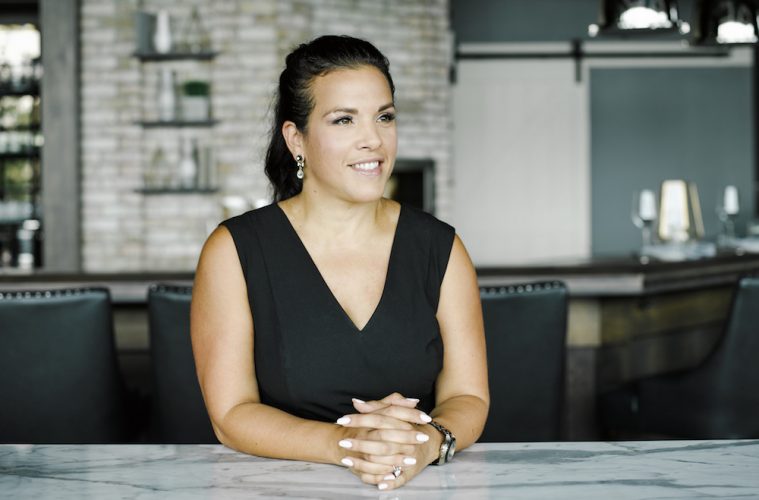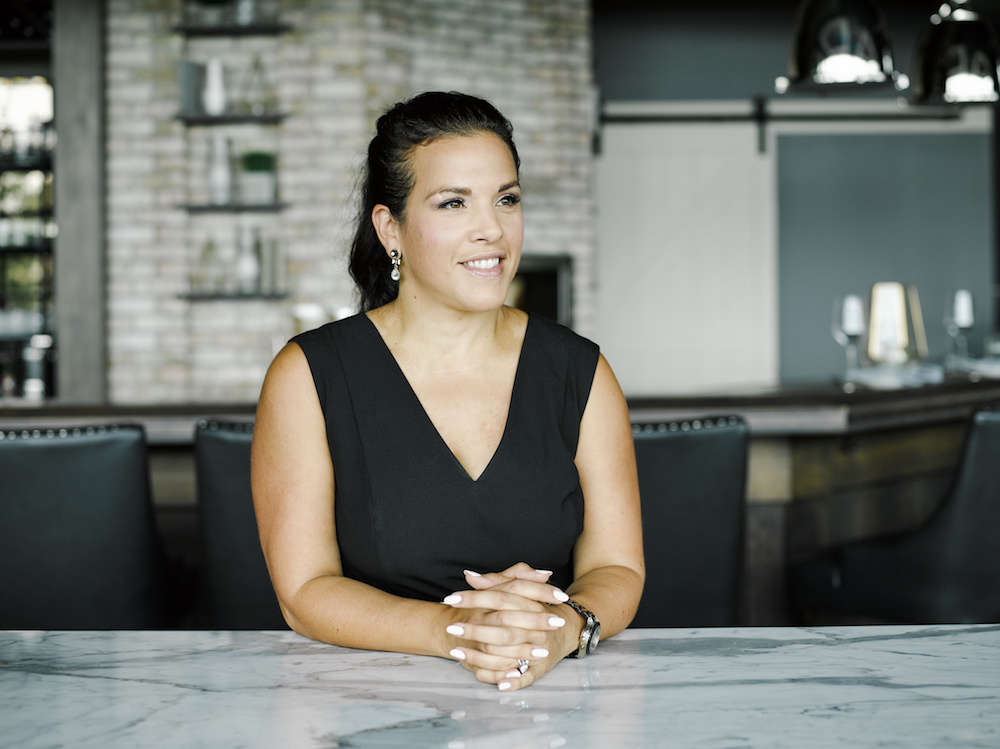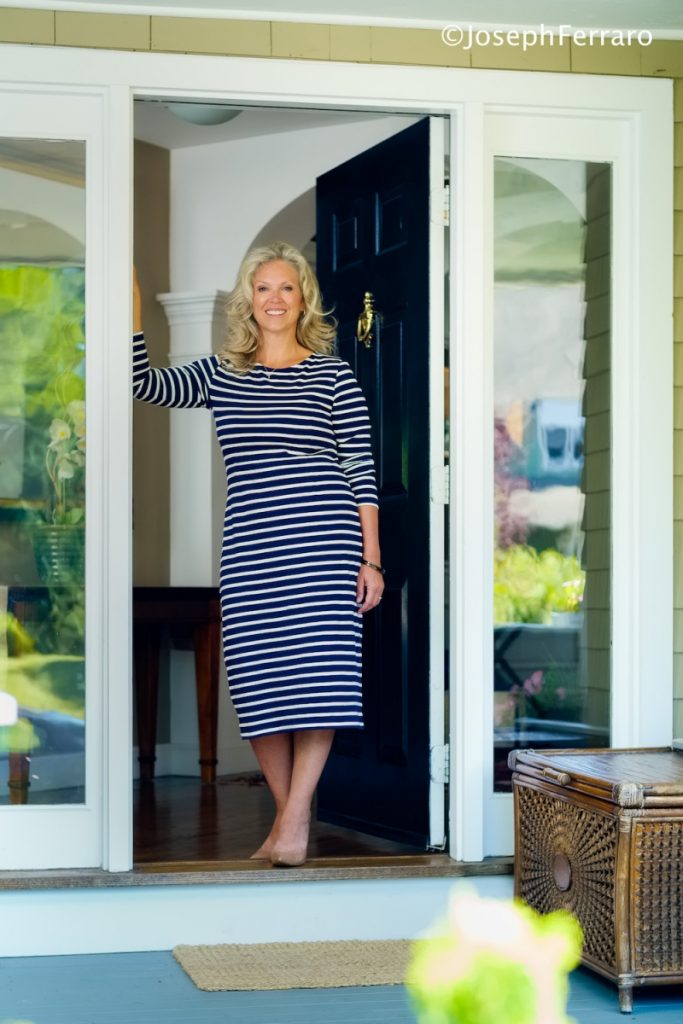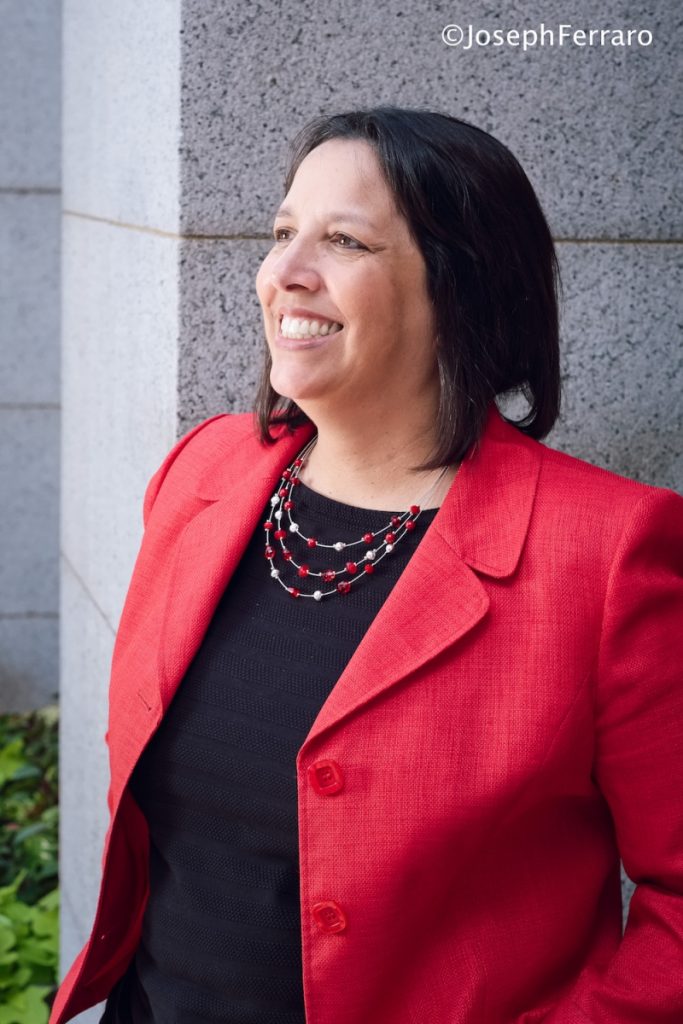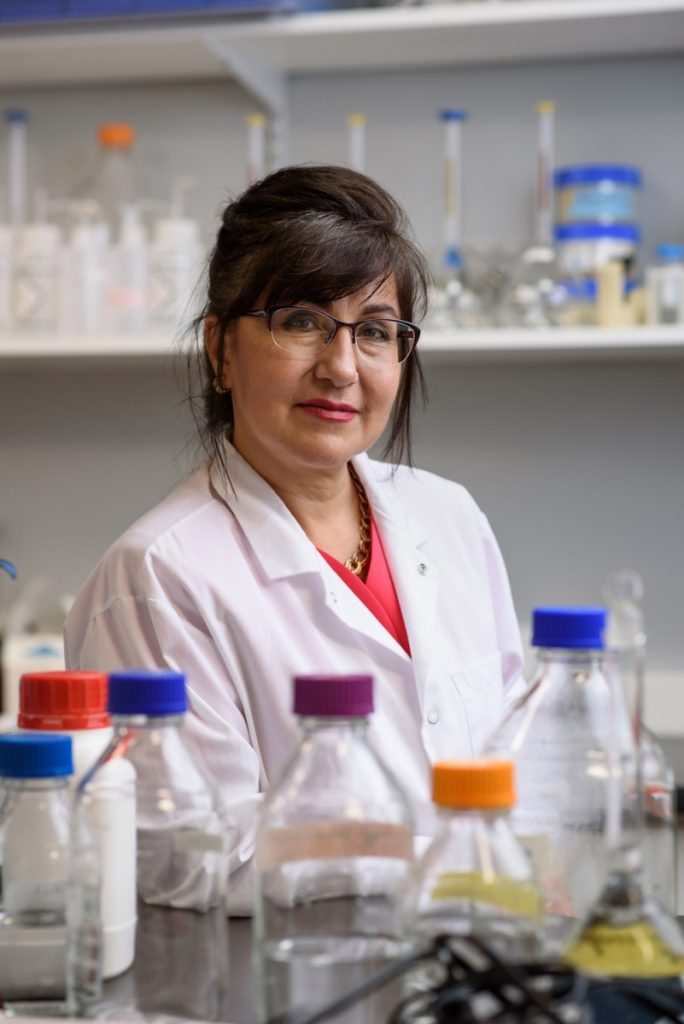The North Shore is chockablock with accomplished, vibrant women who revel in their roles—whether they are executives, academics, moms, businesswomen, worker bees, or any of the hundreds of crossover roles that so many women inhabit today. Here, eight exceptional women describe the journey that brought them to personal success; the people who helped them clear obstacles along the way; and what it’s like to share their talent and wisdom. Read on for some inspirational truth-telling, with a dollop of optimism.
Photo by Doug Levy
Restaurateur
Daniella Mammola
Daniella Mammola’s capsule bio says it all. Her number one job: Mom. Coming in at number two: Restaurateur.
Seeing Mammola label her profession simply as “restaurateur” would bring a smile to the face of anyone who knows this Danvers resident. As the owner and operations manager of Pellana Steakhouse and Alto Forno in Peabody, and Daniella’s Café & Market in Danvers, Mammola serves food that diners rave about. In 2015, she was included in the North of Boston Business Top “40 under 40.”
For real sweet talk, chat with Mammola about her two baby daughters and her husband and business partner, Daniel Mammola. Come afternoon, if she’s not at one of her restaurants, she’s at home cuddling her two daughters, Karena Maria, two, and Siena Vince, eight months. “When we’re home, it’s all about the kids,” she says.
Between nurturing their two daughters and three restaurants, the Mammolas’ days are filled with joys and challenges. Many couples say they could never work together, but the Mammolas prove the opposite. “It’s trying at times, but mostly fun,” Mammola says. “Having a partner that is always on the same page as you is really nice.” So if one comes home needing to vent, there is an understanding person who listens. “We don’t have the same job, but we have the same philosophy,” Mammola says. “We’re not interested in becoming millionaires and not working.”
While Daniella Mammola runs the front of the house, her husband handles back-of-the-house operations, working with their chefs to develop concepts and menus and directing staff in preparations. He grew up around restaurants; the estimable Natalie’s Italian restaurant in Danvers was in his family. Today his cooking combines family heirloom recipes with his own. One big customer favorite is the seasoning on the steak at Pellana. It is Daniel Mammola’s own special recipe; forget about prying it out of him.
Mammola grew up on the North Shore in a close Italian family, and after studying psychology at Bridgewater State University, she found work one summer in the ’90s at a restaurant in Boston. Daniel Mammola was chef; she was a server.
“We became friends,” she says. When Daniel opened Pellana in 2006, he asked her to sign on as general manager. It didn’t take long for a romance to bloom. “You always know the one,” she says. The Mammolas just celebrated their fourth anniversary.
Mammola sees hiring and cultivating staff as a key to success. “The staff truly are the secret to our success,” she says. “I am stopped on the street constantly and told how great our staff is.” Customers often become close to the Mammolas, who have an innate ability to connect people with causes. “We do tons of community outreach,” Mammola says. “We use the strength of the business and our dedication to taking care of our clientele to raise awareness for local charities and organizations we are passionate about.”
A special cause is the North Shore Cancer Center Danvers. Daniel’s mother, Karen Ann Gerry, was treated there for lung cancer. As the accountant and office manager at Pellana, Gerry was “the brain” behind the restaurant, Mammola says. When Gerry died at age 57, the family was devastated but grateful to the center. “We’re so fortunate to have a cancer center on the North Shore,” Mammola says. She is on the Steering Committee for the center’s annual spring Gourmet Gala fundraiser, held at Acura of Peabody.
Life for the couple continues to orbit around a connected, warm circle of work, family, guests, and community. “It’s actually about caring about people,” Mammola says. “It sounds so cliché, so cheesy, but it’s true.”
pellanarestaurant.com, altoforno.com, daniellascafe.com
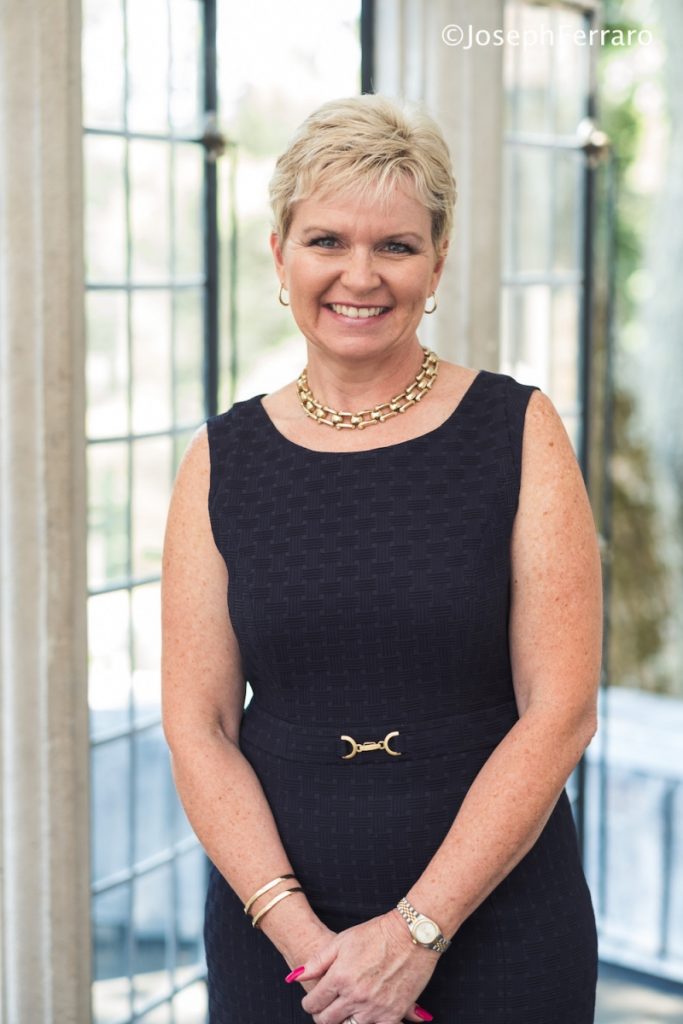
Photo by Joe Ferraro
Academic
Molly Martins
Molly Martins has spent most of her professional life surrounded by men. In her positions as a senior accountant in industry, vice president of New England colleges, owner with her husband, Al Martins, of a commercial construction company, and a former member of Wenham’s Board of Selectmen, Martins’s colleagues have been overwhelmingly male.
“I have a tremendous amount of experience with having to be my own person,” Martins says. Yes, there were occasionally pats on the head, says the mother of five daughters. Yet her career—and the wisdom and skills she gained along the way—was ideal preparation for her most recent endeavor as founder of The Academy at Penguin Hall in Wenham.
The Academy, opened in 2016, is an all-girls school that combines strenuous academics with high-caliber personal and spiritual development. Martins’s role is setting and shepherding the overall direction and vision for the school. The Academy at Penguin Hall is a nonprofit that is operated as a business, and Martins is responsible for maintaining its fiscal health, including formulating business plans, handling personnel issues, hiring faculty, and fundraising. “All of this is under my purview and guidance,” she says. “I wear many, many hats.”
Her work and commitment (Martins estimates she works 70 to 80 hours a week) have built a college preparatory high school with a well-defined core, within a culture of kindness. “We’re very committed to education, enlightenment, empowerment; it’s developing the whole person,” she says. The school’s pastoral 50-acre campus, surrounding the beautiful, spacious 1920s building, provides an ideal environment for growth and reflection.
While The Academy is not under the auspices of the Catholic Archdiocese of Boston, some important Catholic principles guide spiritual development. “The Catholic tradition of education in its simplest form encompasses mind, body, and spirit,” Martins says. “Spirituality is as vital to education as athletics; tolerance and understanding are so important.” Students don’t wear uniforms and are not required to identify a religious affiliation. “We want all individuals to feel comfortable and find their voice for any environment, be it in the boardroom, motherhood, or working in social justice.”
Martins says her opening line with students is this: “Let go of all the limits you’ve put on yourself or been told about yourself.”
“So many girls think they can’t do things,” she adds. “We’re challenging them to be their best. I’ve seen the transformation of girls.” One of the many details that set the tone is a 25-seat boardroom left over from the previous occupant that is used as a classroom. “It demystifies the boardroom for our girls,” she says.
Along with the academic rigor is an emphasis on kindness. Martins explains, “I’ve never understood why we can’t be kind, be supportive, and be doing a terrific job.” Her emphasis on combining a compassionate spirit and sharp business skills began in her early life. “My work ethic is from my parents,” she says. When she left home for college, she followed her heart toward business, earning a degree in accounting and finance from Boston College and an MBA from Bentley University.
The Academy’s remarkable growth, guided by Martins’s business acumen, is a testament to the success of her philosophy. Last year, the school’s first, there were just over 60 students and 22 faculty and staff. This fall, student enrollment is on track to double, along with an increase in faculty and staff to about 30.
Martins’s personal fulfillment has kept pace. “I truly believe that everything in my life has prepared me for this,” she says. “Being in industry, education, a mother—everything in my life has brought me to this place. It’s divine intervention.”
Photo by Joe Ferraro
Real Estate Mogul
Karen Hanson
Karen Hanson wears many hats, as successful people often do. But Hanson, owner and managing broker at By the Sea Sotheby’s International Realty in Beverly Farms, possesses so many hats, and switches them with such speed, that she practically has to hold them down. When asked if she’s a woman on the move, Hanson laughs. “I have my hands in a lot of different things, but it’s all fun,” she says. She is also a dedicated mother with an active social life. The day we talked, she was driving to a celebration in Littleton, her car filled with flowers, champagne, and lanterns.
Her enthusiasm was palpable. “It will be beautiful; I’m excited,” she said. Hanson’s zeal for life and all it holds is doubtless one of the keys to her professional success.
While her firm has sold over a thousand homes, Hanson doesn’t dwell on those numbers. “It’s about the quality of the ones we do, and the experience for the buyer or seller,” she says. The company, which serves Manchester, Beverly, all of Cape Ann, and Newburyport, is reaping great success. (Newburyport is new territory.) Now in the company’s 10th year, Hanson oversees 26 agents; she started with six. “It’s been wonderful to watch the business grow,” she says. Her two closest competitors, she adds, each have multiple offices and around 160 agents, yet year after year, the three companies go neck and neck in the major markets they serve.
In the meantime, Hanson has won awards for being in the top echelon of sales worldwide and contributes to news outlets.
Over half the houses her company represents sell for over $1 million, but Hanson is proud to represent distinctive properties of all types. Consider Cape Ann, a big part of her territory. “The coolest thing about Cape Ann is that we have a $3 million home next to a little jewel box of a home that might be $500,000. That’s what makes the salad so delicious.”
Hanson’s infectious attitude, easygoing spirit, and wicked humor make her relatable to almost anyone. If it’s possible and desired, she essures, it can happen. Naturally this requires risk, and Hanson credits Babson College and her parents. “I love Babson,” she says. “I really embraced the spirit of entrepreneurship. You put it out there, you take the hits; but it feels really good when it comes together.”
She also credits her mother and father. “I owe a great deal to both my parents for sharing their views of the world with me,” she says. “They never said there was anything I couldn’t do”—she pauses and laughs—“contrary to existing evidence.” They encouraged her to try new things and eventually cheered her on when she started her own business. She hopes to inspire her children the same way; she has a son, 16, who attends St. John’s Prep in Danvers, and a daughter, 12, whom she has raised primarily as a single mother.
As a young adult, Hanson was working in marketing and consulting while living in Boston’s Back Bay, where she would visit open houses “recreationally.” “I’ve always been fascinated with the idea of home and family and all that means to a person,” she says. A friend told Hanson she should be in real estate. Fast-forward: “I’ve loved it since day one.”
She doesn’t sell houses herself very often these days, instead supporting her staff and cultivating a positive atmosphere. “I like to stay in the background and let agents take the spotlight,” she says. And that, it seems, is where the salad is. “I think if you surround yourself with great people; care, support, and educate them; [and] trust they’ll do great things…they will.”
Photo by Joe Ferraro
Politician
Mayor Kim Driscoll
For all of Salem’s identities, never before has the city been tinted so green—the green of environmental sustainability, that is. Under the aegis of Mayor Kim Driscoll, first elected in 2005, Salem was tapped as one of the state’s Green Communities, making the city eligible for municipal renewable power and energy efficiency grants. Once the green door opened, more positive developments flowed.
The year 2013 ushered in eight stations for charging electric cars and a mandatory recycling program, among other green initiatives. Since then, Driscoll’s office has been intently focused on the waterfront. After all, she says, “Salem was part of the great age of sail, when ships from Salem dotted the globe.”
Today there is a new high-speed catamaran, the Nathaniel Bowditch, traveling between Salem and Boston, and a new waterfront gateway park, part of a major park renovations program. Driscoll also oversaw the formation of a port authority and is planning a port for cruise ships.
Revitalization is moving swiftly for this city of 43,000, and Driscoll is leading the charge.
“It’s such an opportunity to be a mayor of your town,” says Driscoll, now nearing the end of her third term. Born in Hawaii, she headed east to attend Salem State University (then Salem State College) and stayed. “It’s never boring,” she says of her work. “It means managing a world-class city with the budget and resources of a small city. An average day is like being on roller skates going backwards.”
While Salem moves forward, Driscoll realizes how its history—including the infamous witch trials in the 1600s—built much of its identity. “That history leads to some of our vitality today,” she says.
Driscoll’s background as a city manager allows her to bushwhack through politics when necessary. “There are politics everywhere,” she says. (Driscoll is a Democrat.) “But we’re not paving streets on who we know. We’re trying to be thoughtful about governing and, at the end of the day, serving the residents.”
Driscoll was in municipal government for several years before occupying the mayor’s office. After college, she did an internship as an assistant planner in Salem and went to law school at night. She moved on to be community development director in Beverly, followed by a stint in private practice. Then she landed in Chelsea, as chief legal counsel when the city came out of receivership, and moved onward to the role of city manager.
She feels fortunate to have worked with people who have nurtured her, including Guy Santagate, Chelsea’s first city manager (who guided the city out of receivership), and Jay Ash, Chelsea’s second city manager. She says she gets her work ethic from her parents, and credits her husband, Nick Driscoll, a bricklayer and mason, and their three teenage children for their understanding. After all, she says, “My kids have grown up with their mom being mayor.”
Above all else, Driscoll is a collaborator. “Sometimes it’s getting out of the way and letting things happen,” she says, “and sometimes it’s creating a vision.” She counsels her staff—including two dozen department heads and 12 senior staff members who report directly to her—“to not be afraid of failure.”
Although her name has been associated with opportunities for higher office, Driscoll is content to stay in Salem City Hall for now. Facing reelection this November for her fourth term, she is ready to roll. “Every morning,” Driscoll says, “I get up and am excited about going to work.”
Photo by Shawn Henry
Scientist
Manijeh Goldberg
Manijeh Goldberg of Newburyport has a sense of discovery as sharp as a scalpel and credentials that sparkle with prestige: master’s degrees from the Massachusetts Institute of Technology (MIT) and Harvard Medical School, as well as a PhD from the University of Massachusetts, all achieved within six years. As founder and CEO of Privo Technologies, Goldberg is using her education and experience to develop cancer treatments.
Privo Technologies’ first major project—ongoing for seven years—is a treatment for oral cancer (otherwise known as head and neck cancer). “It’s very challenging and exciting,” Goldberg says. She and her staff are optimistic about the work, using nanotechnology that Goldberg developed as a researcher at MIT’s Koch Cancer Institute.
But Goldberg is no lonely scientist bent over a microscope on an inward journey. As inspired as she is by science, Goldberg is just as passionate about mentoring women and connecting people with opportunities. She has trained almost 20 interns through the Massachusetts Life Sciences Center, an agency that supports and invests in innovation, education, research, and development, and commercialization in life sciences, and she has mentored students and postdoctoral scholars at various institutions.
One of Goldberg’s mentees, Amritpreet Birdi, 28, is a scientist at Privo. Birdi says it has been a great learning experience, mostly due to Goldberg’s guidance. “Manijeh has taught me how to multitask and deliver results in a timely manner,” she says. “I’ve gained experience in research and technology, and grown in leadership, entrepreneurship, and women’s empowerment.”
Privo Technologies’ staff of 10 is motivated by a single vision: making advances in a disease that has bedeviled the scientific community for decades. Sometimes it gets personal. “I’ve lost family because of cancer; two died from side effects,” Goldberg says. “The drug we’re developing for oral cancer has shown promising results; that makes us very excited. It’s a nasty cancer, very disfiguring.”
Goldberg started Privo in December 2015, when she spun off the business from a lab at MIT and moved the work to the office at the Peabody Corporate Center. “I wanted to get back closer to my home, the North Shore,” she says. And with her children off to college, the timing was right.
Every member of her immediate family has had a hand in Privo Technologies and has provided continuous support: her husband, Peter Goldberg, and their grown children, Sonya and Eric, have taken on an assortment of tasks, including writing and editing grant applications and participating in brainstorming sessions. “I couldn’t have done it if it hadn’t been for them,” Goldberg says. Her mother, Mansoureh Tajallai of Newburyport, who as a young widow raised her four children on her own, has been a lifelong role model.
Goldberg talks about her staff—researchers, chemists, biologists, nanotechnologists, and manufacturing and software experts—so warmly that they must feel like a second family. Goldberg has won coveted Innovation Awards from MIT, the National Institutes of Health, and the National Science Foundation, and has private backers as well. The latest funding successes are two multimillion-dollar grants from the National Cancer Institute and the National Institute of Dental and Craniofacial Research.
In January, Goldberg traveled to the White House, where she received the 2016 national Tibbetts Award for outstanding contributions to the Small Business Innovation Research program. “Only 37 companies in the country received this award,” Goldberg says. Being in the rarefied setting got her thinking. “I thought, as a woman, I really want to help women feel empowered at any age,” Goldberg says. “I love to let them see that it’s all doable and they should not be afraid. Fear is the worst enemy of creativity.”
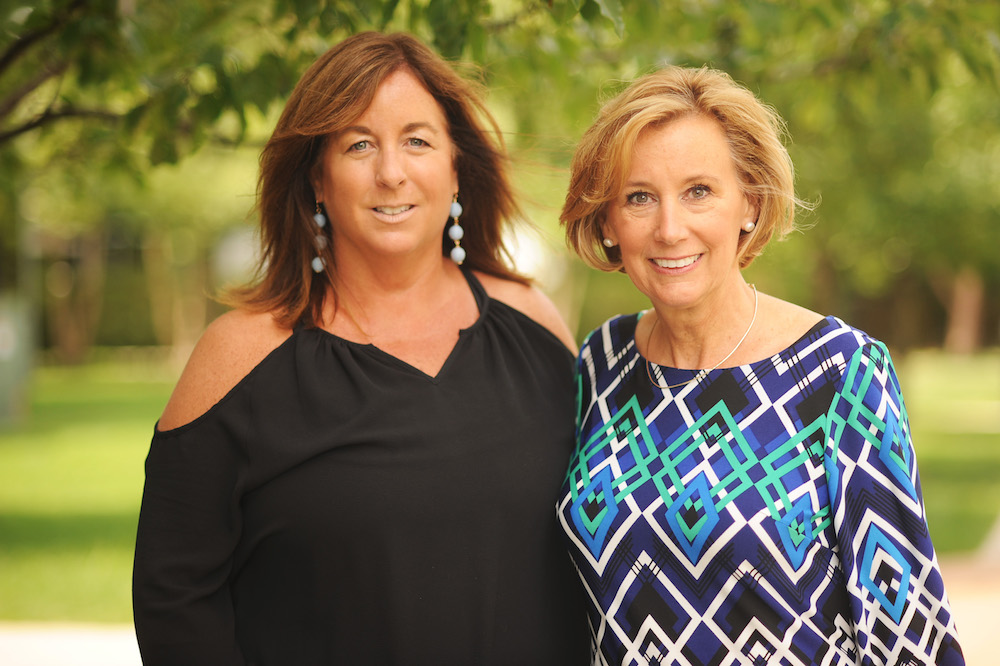
Photo by Michael Basu
Gift Giver
Veronica Weston Moriarty
“You need to be the best possible person you can be each day.”
Veronica Weston Moriarty of North Andover utters the words with conviction and optimism. It’s true that one person can change the status quo. But when a group of people—in this case, women—commit to a cause, be ready for an earth-rumbling storm of growth and positivity.
Moriarty is living it firsthand, as founder and president of Impact 100 Boston, a local chapter of the charitable foundation Impact 100. Each chapter of the worldwide organization aims to engage 100 women, who each give $1,000 to make “transformational” grants. With 44 chapters around the world, Impact 100 had given away more than $45 million by the end of 2016.
Moriarty’s chapter, begun in 2015, gave its first grant of $80,000 in May, to The Second Step, a domestic violence program in Newton. “The gift allows us to start some critical new initiatives,” says program director Matthew Swoveland, including buying a much-needed new van. The next grant, to be given in May 2018, will be larger. “We’re on target to give more than $100,000,” Moriarty says. “We’re in a growth mode.”
Impact 100 Boston is a pass-through foundation, which means that any money that comes in goes out. There is no paid staff, no office, and no corpus. A board of 10 oversees the group of founding members, who jointly determine the grant awardees. Corporate sponsors donate operating expenses and supplies. (Men are invited to join as Friends of Impact 100, a non-voting contingent.)
The Impact 100 mothership was founded by Wendy Steele just before September 11, 2001, while she was living in Cincinnati. “I was troubled by the fact that I had so many women friends who were so bright and capable, and they weren’t participating in [the] community,” Steele recalls. She was speaking in Brookline, between meetings with Moriarty and the local chapter.
“I knew the community needed those women, and the women needed to know what it’s like to be a part of the community,” she says. “So I got out a spiral notebook and built it.” A former banker, Steele also has a consultancy, Generosity Matters, which develops a culture of generosity in families, companies, and nonprofits.
Moriarty became aware of Impact 100 two years ago through her sister, who lives in Chicago and helped found Impact 100 Chicago. The next year, Moriarty turned 50 and felt her life shifting. “I knew I needed to give back,” she says, and she recalls thinking, “Now is the time.” Although she was involved with her church and family—including her husband, Brien Moriarty, and their two sons, now teenagers—she was at a crossroads. “You can get into a rut,” Moriarty says. “Everybody has something to give, whether it’s time, talent, or treasure.”
Moriarty’s mother, Barbara Weston, was an enormous influence on her. As a child in Chappaqua, New York, Moriarty watched her mom model her compassionate beliefs. Today Moriarty works at Polycom in Andover, where she is a sales manager in Cloud Service Providers. And she continues to cultivate Impact 100 Boston, watching it flourish under its dedicated members.
The Boston group already has a first under its belt, as the first chapter to institute Impact 100 Boston Juniors, in which 12 teenage daughters of Impact 100 members pooled $200 each for a project. The junior group’s first project, last July, was “Adopt a Room,” in which the young women decorated and furnished an apartment—including stuffed animals for the children’s beds—for The Second Step.
Says Moriarty proudly, “We’re the only Impact 100 to do this.”
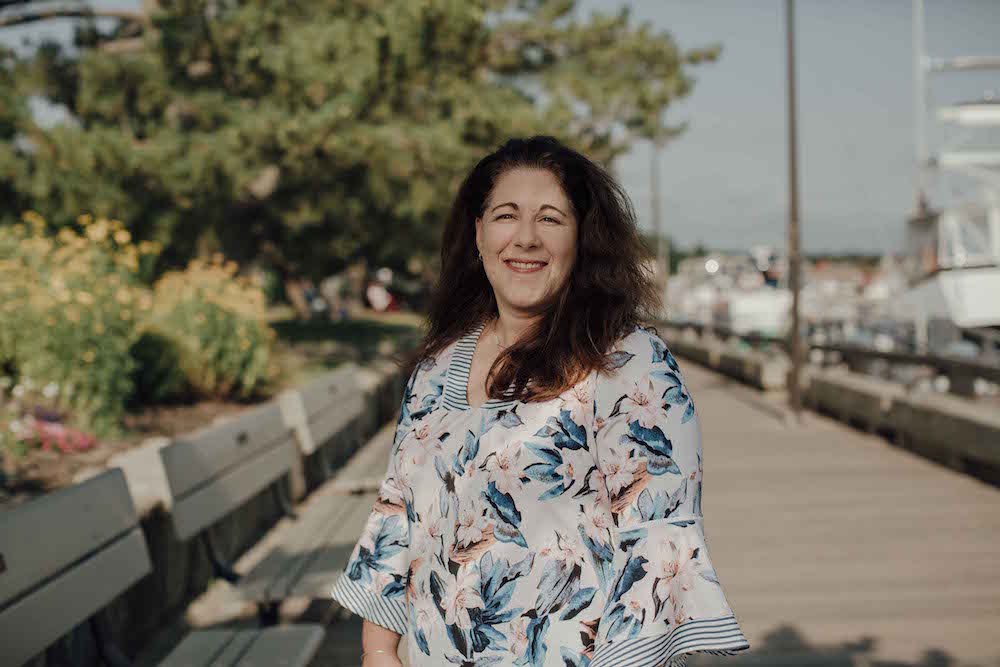
Photo by Matt Kalinowski
Consummate host
Ann Marie Casey
If you think you know the pulse of the North Shore as well as you know your own, you need to have a chat with Ann Marie Casey. As executive director and COO of the North of Boston Convention & Visitors Bureau (NBCVB), Casey can spontaneously recite an impressive array of facts about the area and all the features that attract worldwide visitors.
Visitors to the 34 cities and towns in Essex County generate close to $1 billion in revenue each year. Casey steers the ship, responsible for helping them find the good things in life in the local area, whether the visit is for a wedding, meeting, family reunion, or vacation. And she does it with a staff of just 12, including herself, and an annual budget of under $1 million.
So the big question this particular day is: How does she manage it all? “Everyone’s doing more with less today,” Casey says. “You’ve got to be creative and have good management skills.”
The nonprofit, membership-based NBCVB is one of the state’s 16 regional tourism councils and the liaison between the North of Boston region and the Massachusetts Office of Travel and Tourism. (Casey’s staff also operates the Maria Miles Visitor Center on I-95 southbound in Salisbury, which serves 400,000 travelers every year.)
Casey’s main job is producing good marketing strategies to increase overnight visitors to Massachusetts, both domestic and international, and promoting the area as a coveted destination for, as Casey says, “leisure, groups, meetings, and special events like weddings.” Work can get stressful, she says. “But my job is much more exciting than stressful.”
Besides the area’s many attractions and rich history, the North Shore has another advantage: its proximity to Boston. “This is a great alternative for folks, to come north of Boston and in and out of the city,” Casey says. “We’re very drivable.”
International travel to the North of Boston region has been steady, Casey says, although not from every country. Visitors from Canada, for a long while the area’s biggest international market, have declined recently. While people wonder about the possible effects of the political climate, Casey believes the decline, which started in 2015, is due to the strong US dollar. “I think it’s more economical than political,” she says. Reports say that visitors from the United Kingdom are up, but spending is lower. “Again, that has much to do with the strength of the dollar,” Casey adds.
Although promotion is a big part of Casey’s job, she is excited about another aspect: a mini-grant program for nonprofit organizations’ marketing programs. Grants can range from around $300 to $8,000; in the last five years, the organization has awarded more than $200,000.
Casey herself is a fan of blending digital and print marketing. She likes digital’s ability to produce quantitative results fast, through such means as click-throughs. And the North of Boston Travel Guide & Map, a color booklet, is quickly running through its first printing, with 125,000 distributed since February. She is partnering with other regions, including Plymouth County (travelmasscoast.com) and Merrimack Valley (lobsterandliberty.com). “We love to partner,” she says. “It’s really important.”
Now a Wilmington resident, Casey attended Emerson College for a BA in communications, politics, and law, and launched her career at the State House. An MBA followed a few years later. A vibrant education, strong administrative skills, and mentors have contributed to her leadership capability. Her parents were a vital influence. “They are very dedicated and compassionate people,” she says. “They raised me to work as a team player and not ask anyone to do anything that I wouldn’t do.”

Photo by Doug Levy
Advisor
Victoria Bondoc
Sometimes the unspoken word is more powerful than anything said aloud. Consider Victoria R. Bondoc, founder and CEO of Gemini, a Burlington firm that advises national security leaders and businesses in the use of strategies, technologies, and logistics to render successful operations.
You might think that almost all of Gemini’s work is classified, but Bondoc can’t say. “I can say that most of our business is in support of the US Department of Defense and the Department of Homeland Security,” she says.
Bondoc, personable and engaging, gives an example. “If a Navy SEAL team has to rescue a hostage, they can’t just parachute down and run around; that would be chaos,” she says. “They need a plan. They need to know as much as they can about how many guards there are, what building the hostage is in, is there any security, and so forth.” Gemini supplies at least two fallback plans for every scenario, “because,” Bondoc muses, “things never go the way you think they will.”
Any details she can share? Basically, no, Bondoc says. “But for a plan, like any person would put together, you need to know where you’re going, what’s the fastest way to get there, what’s the weather, how you’ll get there. You leverage as many things as you can and identify all the risks and how you’re going to minimize the risks.” Gemini operates at 12 locations around the world; most of the time, the clients are US military organizations.
Bondoc didn’t say if she has faced discrimination as a woman in her field, but says that when there is an obstacle, you make it an opportunity. “When there’s a discriminator that causes [the woman] to stand out, that’s a good thing, because now you have all this attention. Now that you have this attention, you have to make darn sure you’re doing the right things.… It’s an opportunity.”
A Lexington resident for 20 years, Bondoc grew up in Massachusetts and got her bachelor’s degree in math from MIT and her master’s in computer science from Boston University. “I’m kind of surprised that I ended up starting a business,” she says, “because I never took a business course.” She started Gemini in 1986 and celebrated the firm’s 30th anniversary in August 2016. In her leadership presentation, “Battlefield to Boardroom,” she teaches business executives how to achieve success.
Bondoc is single and lives in a house she loves. A big Patriots fan, she tries to attend a few games every season, and she watches TV to give her mind a break. She works 80 or 90 hours a week and sleeps, as she says, “a normal four to five hours.” Her awards include a Certificate of Special Congressional Recognition; 2017 Massachusetts Person of the Year; and the US Small Business Administration’s 2017 Woman Business Owner of the Year.
Her parents, both medical doctors born in the Philippines, were a big influence. Bondoc speaks of them with pride. “They took care of the sick and the injured in addition to their family,” she says. “I would not have achieved the success I have without them. They taught me everything.”
Gemini has more than longevity; the firm has reaped success on every front. “I’m very proud that Gemini has created more than 1,300 jobs and generated more than $300 million in sales, adding to the US economy,” Bondoc says.
Considering those numbers, Bondoc and Gemini have a surprisingly low profile. When an observer says, “You’re pretty much under the radar,” Bondoc laughs lightly and counters, “I’d kind of have to be, right?”

